|
黄钰生(字子坚)
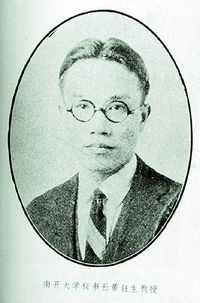
南开大学秘书长(1925-37)黄钰生教授
黄钰生先生,字子坚,1898年出生在湖北沔阳(今仙桃市)。1911年投靠位于天津的舅父卢木斋。1915年毕业于天津南开学校考取清华学校留美预备班。1919年官费留学美国进入芝加哥大学,1923年拿到芝加哥大学教育心理学硕士学位。1925年回国返回南开大学担任哲学教授,1927年担任其大学部主任,不久转为秘书长。
七七事变后协助老校长张伯苓负责转移南开大学师资力量和仪器物品至长沙临时大学。1938年战事告急三校师生被迫又转移到云南昆明。他负责三条转移路线中最辛苦的一条“湘黔滇旅行团”,担任“教师辅导委员会”主席,和其他教授闻一多、袁复礼、李继侗、曾昭抡、吴征镒等步行三千多里,艰苦跋涉两个多月终于来到昆明。
国立西南联合大学成立后担任学校建设长。1938年秋西南联大增设师范学院,黄钰生被任命为院长,同时兼任师院附属中学、小学的主任。抗战胜利后,被张伯苓校长派遣回天津复校。担任天津市教育局长和南开大学秘书长。1952年三反五反运动期间,黄钰生一度蒙冤被诬陷私藏资金,经调查清白后迫于局势压力同意被调离教育岗位,委任为天津图书馆馆长。粉碎“四人帮”后担任天津市政协副主席,并任第五届和第六届全国政协委员。1981年率团参加美国图书馆学会第一百次年会。[2]1986年加入中国共产党。
1990年4月11日在天津逝世,享年92岁。
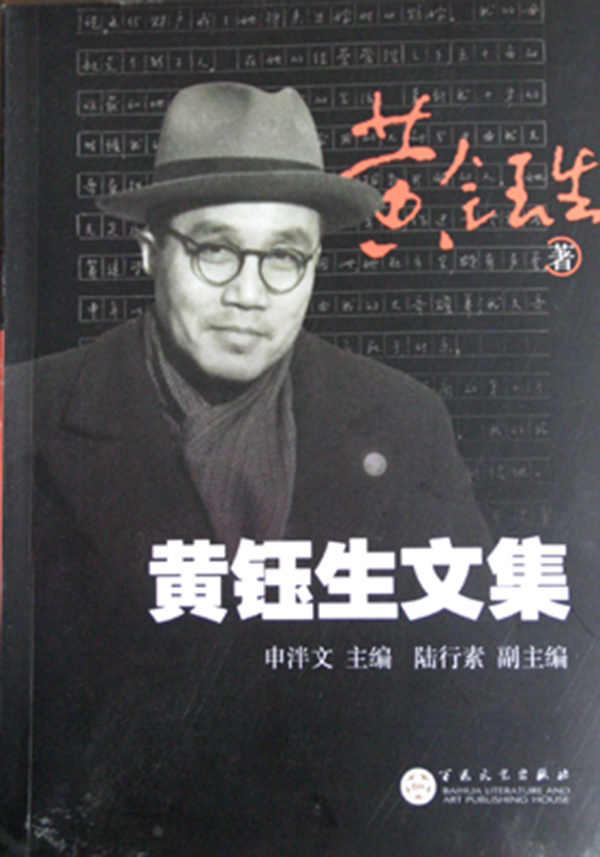
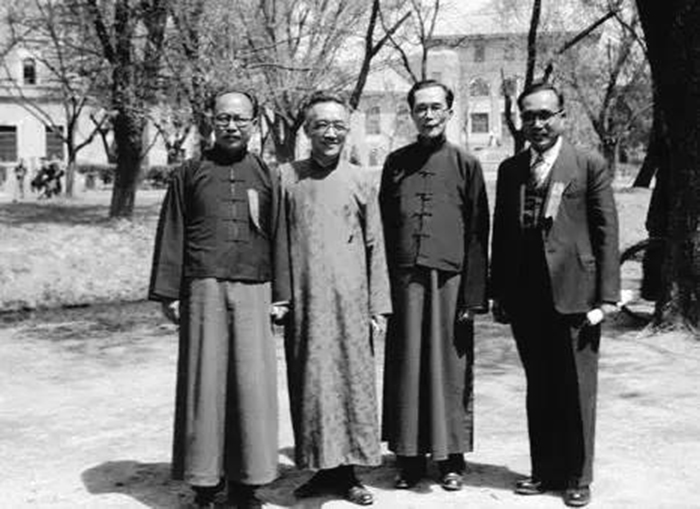
抗战胜利后,在北京清华园:左起查良钊、胡适、梅贻琦、黄钰生。云南师范大学供图
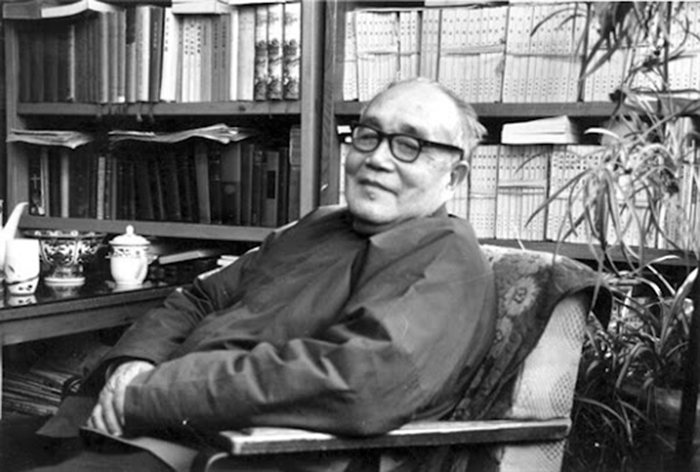
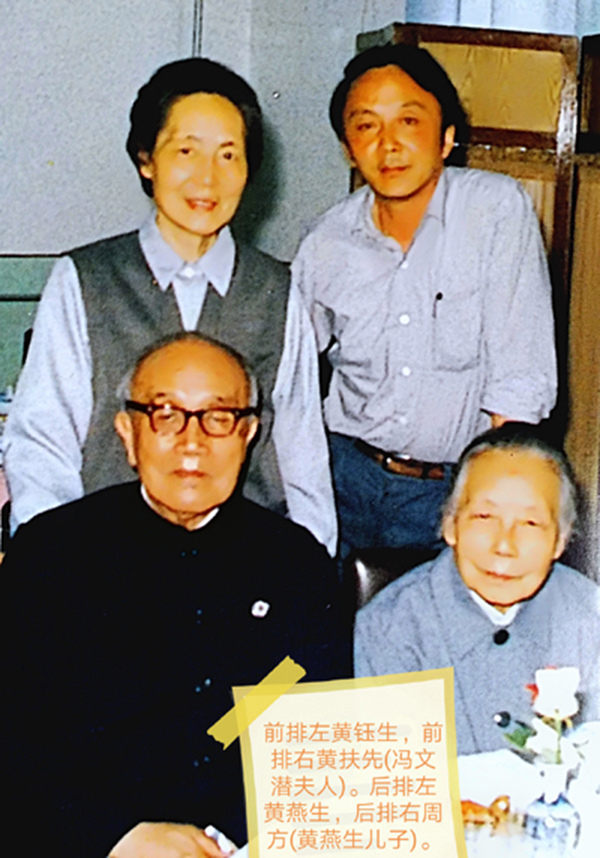

西南联大80周年校庆之际,云南师范大学为首任院長雕塑举行隆重揭幕仪式!2018年10月31日
  
 纪念黄钰生先生逝世30周年-追寻父亲的足迹 纪念黄钰生先生逝世30周年-追寻父亲的足迹
|
English Playwright, Poet William Shakespeare (1564-1616) |

(This work of art is in the public domain.)
|
William Shakespeare (26 April 1564 – 23 April 1616)was an English poet and playwright, widely regarded as the greatest writer in the English language and the world's preeminent dramatist. He is often called England's national poet and the "Bard of Avon" (or simply "The Bard"). His surviving works consist of 38 plays, 154 sonnets, two long narrative poems, and several other poems. His plays have been translated into every major living language and are performed more often than those of any other playwright. Shakespeare was born and raised in Stratford-upon-Avon. At the age of 18, he married Anne Hathaway, who bore him three children: Susanna, and twins Hamnet and Judith. Between 1585 and 1592, he began a successful career in London as an actor, writer, and part owner of a playing company called the Lord Chamberlain's Men, later known as the King's Men. He appears to have retired to Stratford around 1613, where he died three years later. Few records of Shakespeare's private life survive, and there has been considerable speculation about such matters as his physical appearance, sexuality, religious beliefs, and whether the works attributed to him were written by others. Shakespeare produced most of his known work between 1590 and 1613. His early plays were mainly comedies and histories, genres he raised to the peak of sophistication and artistry by the end of the sixteenth century. He then wrote mainly tragedies until about 1608, including Hamlet, King Lear, and Macbeth, considered some of the finest works in the English language. In his last phase, he wrote tragicomedies, also known as romances, and collaborated with other playwrights. Many of his plays were published in editions of varying quality and accuracy during his lifetime. In 1623, two of his former theatrical colleagues published the First Folio, a collected edition of his dramatic works that included all but two of the plays now recognised as Shakespeare's. Shakespeare was a respected poet and playwright in his own day, but his reputation did not rise to its present heights until the nineteenth century. The Romantics, in particular, acclaimed Shakespeare's genius, and the Victorians hero-worshipped Shakespeare with a reverence that George Bernard Shaw called "bardolatry". In the twentieth century, his work was repeatedly adopted and rediscovered by new movements in scholarship and performance. His plays remain highly popular today and are constantly studied, performed and reinterpreted in diverse cultural and political contexts throughout the world.
|
Sonnet 18
by William Shakespeare
Shall I compare thee to a summer's day?
Thou art more lovely and more temperate:
Rough winds do shake the darling buds of May,
And summer's lease hath all too short a date:
Sometime too hot the eye of heaven shines,
And often is his gold complexion dimmed,
And every fair from fair sometime declines,
By chance, or nature's changing course untrimmed:
But thy eternal summer shall not fade,
Nor lose possession of that fair thou ow'st,
Nor shall death brag thou wand'rest in his shade,
When in eternal lines to time thou grow'st,
So long as men can breathe or eyes can see,
So long lives this, and this gives life to thee.
|
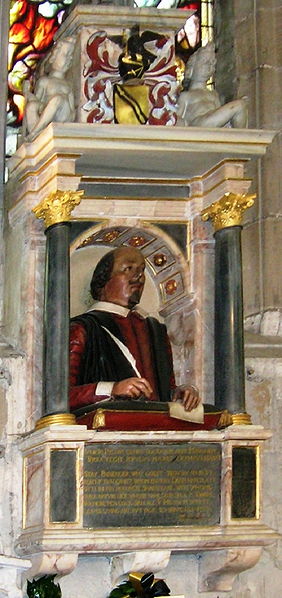
Shakespeare's funerary monument (part), Holy Trinity Church, Stratford Upon Avon, England.
(This work of art is in the public domain.)
Sonnet 116
by William Shakespeare
Let me not to the marriage of true minds
Admit impediments, love is not love
Which alters when it alteration finds,
Or bends with the remover to remove.
O no, it is an ever-fixed mark
That looks on tempests and is never shaken;
It is the star to every wand'ring bark,
Whose worth's unknown, although his height be taken.
Love's not Time's fool, though rosy lips and cheeks
Within his bending sickle's compass come,
Love alters not with his brief hours and weeks,
But bears it out even to the edge of doom:
If this be error and upon me proved,
I never writ, nor no man ever loved. |
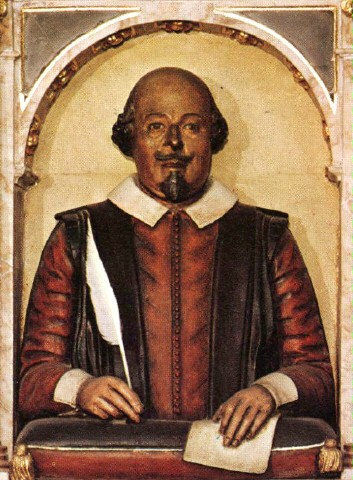
Shakespeare's funerary monument (part), Holy Trinity Church, Stratford Upon Avon, England.
(This work of art is in the public domain.)
Macbeth:
by William Shakespeare
Accursed be that tongue that tells me so;
For it has cow'd my better part of man!
And be these juggling fiends no more believed
That palter with us in a double sense;
That keep the word of promise to our ear;
And break it to our hope! -- I'll not fight with thee.
--from Macbeth, Act V, Scene VIII, L21-26 ,
|
|
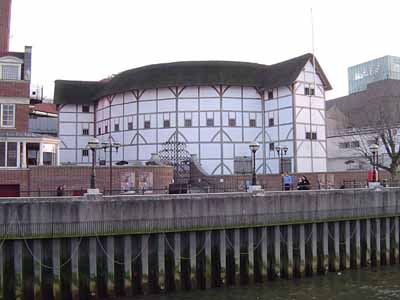
Shakespeare Global Theatre (reconstructed), London。
(
Licensed under the GNU Free Documentation License.)
Dirge from Cymbeline
by William Shakespeare
Fear no more the heat o' the sun,
Nor the furious winter's rages;
Thou thy worldly task hast done,
Home art gone and ta'en thy wages;
Golden lads and girls all must,
As chimney sweepers, come to dust.
Fear no more the frown o' th' great;
Thou art past the tyrant's stroke:
Care no more to clothe and eat;
To thee the reed is as the oak:
The sceptre, learning, physic, must
all follow this, and come to dust.
Fear no more the lightning flash,
The all dreaded thunder stone;
Fear no slander, censure rash;
Thou has finished joy and moan.
All lovers young, all lovers must
consign to thee, and come to dust.
No exorcisor harm thee,
Nor no witchcraft charm thee!
Ghost unlaid forbear thee,
Nothing ill come near thee.
Quiet consummation have,
And renowned be thy grave!
|
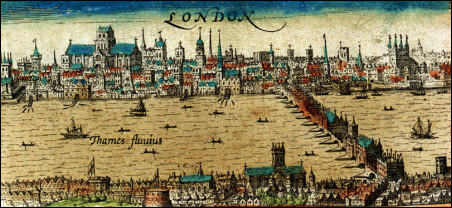
Shakespeare's London (This work of art is in public domain.)
Rape of Lucrece (except)
by William Shakespear
FROM the besieged Ardea all in post
Borne by the trustless wings of false desire,
Lust-breathed Tarquin leaves the Roman host,
And to Collatium bears the lightless fire
Which, in pale embers hid, lurks to aspire
And girdle with embracing flames the waist
Of Collatine's fair love, Lucrece the chaste.
Haply that name of chaste unhapp'ly set
This bateless edge on his keen appetite;
When Collatine unwisely did not let
To praise the clear unmatched red and white
Which triumphed in that sky of his delight,
Where mortal stars, as bright as heaven's beauties,
With pure aspects did him peculiar duties.
For he the night before, in Tarquin's tent,
Unlocked the treasure of his happy state;
What priceless wealth the heavens had him lent
In the possession of his beauteous mate;
Reck'ning his fortune at such high-proud rate
That kings might be espoused to more fame,
But king nor peer to such a peerless dame. |
| |
|
|
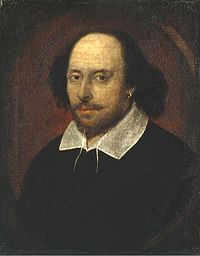
(This work of art is in public domain.) 
(This work of art is in public domain.)
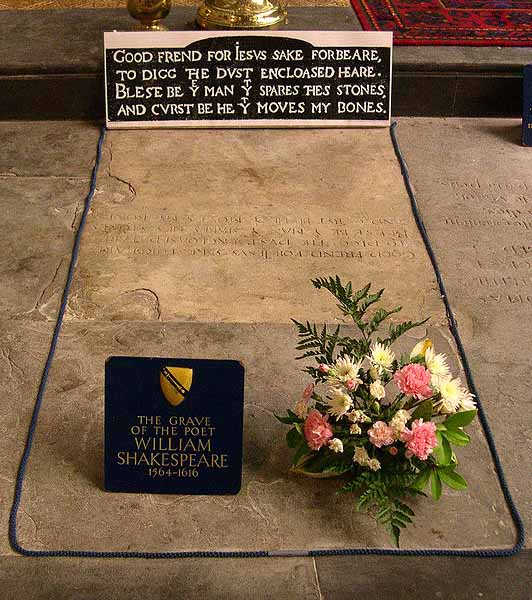
Sheakespeare's Grave, picture by David Jones, licenced under these terms.
 
|
   
|




